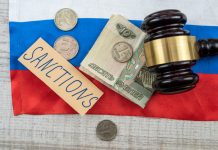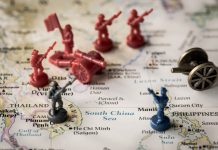This article examines how the Philippines challenged China’s expansive maritime claim in the South China Sea during President Aquino’s term and also explores the crucial question of whether the next administration will continue or discontinue the Aquino Administration’s geo-political agenda.
During his six-year term, President Aquino has triggered a “revolution” in Philippine foreign policy as he challenged China’s expansionist moves in the South China Sea. In effect, he has brought back “geo-politics” as a component of the country’s external relations. After the withdrawal of the US forces from the Philippines in late 1992, three former Philippine presidents (Ramos, Estrada, and Arroyo) had steered Philippine foreign policy away from geo-politics/high politics. Intentionally, they avoided the great political games the big powers play and concentrated on development diplomacy and on the protection of the interests and welfare of Overseas Filipino Workers (OFW). President Aquino altered this pattern by confronting the South China Sea dispute head-on.
This article examines how the Philippines challenged China’s expansive maritime claim in the South China Sea during President Aquino’s term. It also explores the crucial question of whether the next administration will continue or discontinue the Aquino Administration’s geo-political agenda of standing up to the China’s challenge in the South China Sea by strengthening its security ties with the US and Japan. President Aquino’s successor – President-elect Rodrigo Duterte – will have to weigh whether or not adopting this foreign policy of challenging China’s expansive maritime claim is worth pursuing given other foreign policy concerns (economic diplomacy and protection of the welfare and interests of OFWs) and the opportunity cost of a strained bilateral relationship with the second largest economy in the world. He will also have to face the geopolitical realities of the South China Sea dispute.
Challenging China’s Expansion in the South China Sea
During his six-year term, President Aquino has discarded his predecessor’s (President Gloria Macapagal Arroyo’s) policy of equi-balancing the US and China. Instead, he fostered closer security cooperation with the US as a matter of policy. This could be traced back to 2011 when President Aquino stood up to China’s expansive claim and heavy-handed behaviour in the South China Sea. He redirected the AFP’s focus from domestic security to territorial defence; bolstered deeper Philippine-US security arrangements; requisitioned American military equipment; and sought from Washington an unequivocal security guarantee under the 1951 MDT. The most salient component of this foreign policy is the signing of the Enhanced Defense Cooperation Agreement (EDCA) in April 2014. The EDCA provides American forward-deployed forces strategic rotational presence in Philippine territory, as well as broad access to Philippine military facilities. Clearly, the updated security agreement has been designed to strategically constrain China, which has stepped up its territorial foothold in the South China Sea.
Similarly, the Aquino Administration has forged closer security relations with Japan, another US ally and China’s rival in East Asia. On the one hand, Prime Minister Abe has committed to provide 10 patrol boats to enable the PCG to safe guard the Philippines’ maritime territory. On the other hand, President Aquino has endorsed Prime Minister Abe’s move to reinterpret the 1947 Japanese Constitution allowing the SDF to assist allies like the US and possibly, the Philippines in case of an armed confrontation with China in the South China Sea. The Philippines has also challenged China to bring the dispute for arbitration by the United Nations Law of the Sea (UNCLOS). China flatly rejected Manila’s plan to resolve the issue before the arbitral tribunal of the UNCLOS and insisted that the dispute be settled through diplomacy and bilateral negotiations. In filing the claim against China, the Philippines seeks a multilateral and legal solution to the maritime dispute in which the interests of the international society are at stake.
The Challenge for the Duterte Administration
Like some of the 2016 presidential candidates, Mayor Duterte called for closer relations with China, and has underscored the necessity of being pragmatic and non-confrontational with China over the South China Sea dispute. He declared during his campaign that he is willing to have bilateral talks with China over the West Philippine Sea/South China Sea dispute. He also suggested the possibility of joint exploration of the South China Sea’s natural resources and expressed that he would like to see China building railroads in the troubled island of Mindanao in exchange for his temporary silence on the maritime dispute.[1] Mayor Duterte was also disparaging of the Philippine-US alliance as he said that he has little confidence that the United States would honour its treaty commitment to the Philippines when it comes to the South China Sea dispute.[2]
After the election, however, President elect Duterte changed his tune. During election day, Mayor Duterte declared that if he became president he would settle the territorial disputes in the South China Sea through multilateral negotiations that would include allies such as the United States, Japan, and Australia as well as claimant states.[3] This is clearly a reversal of his earlier position of relying on bilateral negotiations with China to resolve the territorial rows in the South China Sea. Recently, President elect Duterte said that he “will never surrender the Philippines’ sovereign right over Scarborough Shoal” after holding talks with China’s ambassador to Manila Zhang Jianhua.[4] He also added that he did not discuss the South China dispute with the Chinese envoy because the Philippines is still anticipating the Arbitral Tribunal’s decision on the Philippines’ claim against China in the Hague.[5] This statement is shows a turnaround of his earlier position of skepticism toward the Philippines’ claims against China given that the latter’s declaration that it will not accept the tribunal’s decisions. The incoming administration’s slow but sure about-face of its earlier pronouncements on the South China Sea dispute is captured by incoming Foreign Secretary Perfecto Yasay’s pronouncement “that relations with China should improve as long as China adheres to the rule of law, respects our (Philippine) territorial integrity and sovereignty”.[6]
Interestingly, Mayor Duterte has also changed his cynical view on Philippine-US security relations. In late May 2016, he declared that he is in favour of continuing the Enhanced Defense Cooperation Agreement (EDCA) between the Philippines and the United States because of the limited capabilities of the Armed Forces of the Philippines (AFP).[7] In a press conference, he said that he does not have a problem with EDCA specifically on the use of Philippine military bases by the United States military because the Philippines “doesn’t have good external defence capabilities”. His only qualification to EDCA’s implementation is that US forces “could not use any other place without the knowledge or until there is advice from the (Philippine) Armed Forces”.[8]
The Imperatives of Geopolitics
Whether the President-elect Duterte will continue President Aquino’s policy of traditional geo-politics or pursue a policy of accommodation with China, he or she must take into account four factors. Firstly, the new president must first consider public opinion vis-à-vis China. Since the 2012 Scarborough Shoal Stand-off, the majority of Filipinos have developed an unfavourable image of China. Another factor that the new president has to consider is the AFP’s shift from internal to territorial defence, a vital component of the Aquino Administration’s balancing policy on China. If the new president decides to accommodate China, he or she must stop or slow-down the AFP’s shift from internal security to territorial defence, as well as reverse the bureaucratic processes that President Aquino started when he decided to challenge China. Such moves may cause discontent within the AFP.
Thirdly, President Aquino has relied on a classical balancing strategy against China by engaging other major powers for diplomatic and military support. Fortunately, the US and Japan have accommodated President Aquino’s efforts to involve them in a balancing strategy against China as they forged security arrangements with the Philippines. Finally and more importantly, the new president needs to examine China’s unilateral condition for an entente with the Philippines. Foreign Minister Wang Wi, during his first visit to Manila, was very emphatic about China’s view that the Philippines is primarily responsible for the tension in the Philippine-China bilateral ties and “it is up to the Philippines to heal the rift over the South China Sea”. This means that the new president early in his or her term may possibly disregard the advisory opinions (whether favourable or not for the Philippines) of the International Arbitral Tribunal on the UNCLOS, gravitate away from its security partners, the United States and Japan, stop or slow down the AFP’s shift to territorial defence, accommodate China’s expansionist design in the South China Sea by accepting an untested and untried method of joint development, and not expecting any concession from China in return.
Conclusion
Like some of the 2016 presidential candidates, President-elect Duterte called for closer relations with China, and had underscored the necessity of being pragmatic and non-confrontational with China over the South China Sea dispute. Whether he will continue President Aquino’s policy of traditional geo-politics or pursue a policy of accommodation with China or not, it behooves him to consider four very important factors, namely: a) public opinion; b) the AFP’s shift from internal security to territorial defence; c) the growing involvement of the US and Japan in the South China sea dispute; and finally, d) China’s unilateral condition for any improvement in its bilateral relations with the Philippines. If he decides to accommodate China’s expansion in the South China Sea, President elect Duterte will do well to reflect on how the Filipinos, the US, Japan, and the global community will view his new and potentially risky gambit toward this emerging power in East Asia.
Featured image courtesy of: AP Images Team
About the Author
 Renato Cruz De Castro is a full professor in the International Studies Department, De La Salle University, Manila, and holds the Charles Lui Chi Keung Professorial Chair in China Studies. He is also a member of the Board of Trustees of the Albert Del Rosario Institute for Strategic and International Studies (ADR Institute) A current consultant in the National Security Council of the Philippines, Professor De Castro’s research interests include Philippine-US security relations, Philippine defence and foreign policies, US defence and foreign policies in East Asia, and the international politics of East Asia.
Renato Cruz De Castro is a full professor in the International Studies Department, De La Salle University, Manila, and holds the Charles Lui Chi Keung Professorial Chair in China Studies. He is also a member of the Board of Trustees of the Albert Del Rosario Institute for Strategic and International Studies (ADR Institute) A current consultant in the National Security Council of the Philippines, Professor De Castro’s research interests include Philippine-US security relations, Philippine defence and foreign policies, US defence and foreign policies in East Asia, and the international politics of East Asia.
References
1. Dan Steinbock, “Could Duterte’s Ascent Mean Cooler Philippine Ties with U.S.” CNN Wire Service (10 May 2016). p.1.
2. David Feith, “The New Political Risk in the South China Sea,” The Wall Street Journal Asia (18 May 2016).p. 1. http://search.proquest.com/docview/1789309151?accountid=28547
3. Reuters, “Philippines’ Duterte Calls for Summit to Solve South China Sea Spat,” Reuters (9 May 2016). p. 1.
4. Neil Jerome Morales, “Duterte Says He Won’t Surrender Rights in the South China Sea,” Reuters (3 June 2016).p.1.
5. Ibid. p. 1.
6. Barry Desker, “President Duterte: A Different Philippine Leader,” RSIS Commentary (14 June 2016).p.2.
7. Alexis Romero, “Duterte to Continue EDCA,” Philippine Star (25 May 2016). p. 2.
8. Joel Dizon, “Duterte: No Problem with EDCA-Sanctioned U.S. Sue of PH Bases,” UPDATE.PH (14 June 2016).p.1.






























































